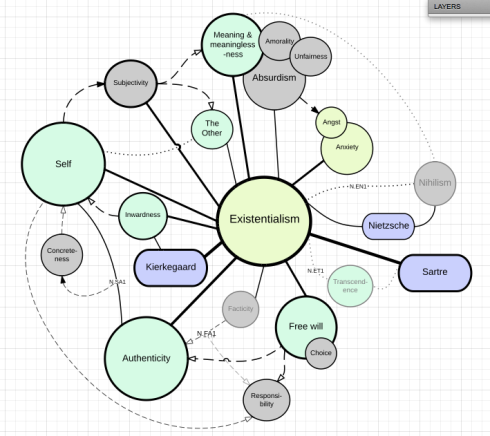“Dream is destiny”
Today I finished the animated film “Waking Life.”
The film meanders through a variety of lessons and questions that the main character encounters, mostly having to do with the state of reality, state of dreaming and meaning of life and death.
It definitely got me thinking more about dreams, and if I can possibly enter a lucid dreaming state. There was a lot of philosophical references, including a Kierkegaard quote.
Quotes I liked:
On Existentialism
“The reason I refuse to take existentialism as just another French fashion or historical curiosity, is that I think it has something very important to offer us for the new century. I’m afraid we are losing the real virtues of living life passionately, a sense of taking responsibility for who you are; the ability to make something of yourself and feeling good about life. Existentialism is often discussed as if it is a philosophy of despair, but I think the truth is just the opposite. […] one thing that comes out in reading these guys, is not so much an anguish about life, so much as, a real kind of exuberance of feeling on top of it; it’s like, your life is yours to create. […]When Sartre’ talks about responsibility… it is something very concrete. It’s you and me talking, making decisions, doing things and taking the consequences. […]What you do makes a difference. […].It is always our decision who we are”
On Democracy
“And they haven’t given us any other options, outside the occasional, purely symbolic, participatory act of voting. You want the puppet on the right, or the puppet on the left?”
On Reincarnation & Collective Memory
“What I am trying to say is that reincarnation is just a poetic expression of what collective memory is. […]It’s like we’re all telepathically sharing our experiences.”
On Liberation
The quest is to be liberated from the negative, which is really our own will to nothingness, and once having said yes to the instant, the affirmation is contagious. […]To say yes to one instant, is to say yes to all of existence.
Emptyness of the Universe
Yes it’s empty with such fullness. The great moment, the great life of the universe is pulsating within it.
On Human Potential and Fear
Actually the gap between, say, Plato or Nietzsche, and the average human is greater than the gap between that chimpanzee and the average human. The realm of the real spirit: the true artist, the saint, the philosopher – is rarely achieved. Why so few? Why is world history and evolution not stories of progress, rather this endless and futile addition of zeroes. …Hell the Greeks, 3,000 years ago, were just as advanced as we are. So what are these barriers that keep people from reaching anywhere near their real potential? The answer to that can be found in another question, and that’s this: Which is the most universal characteristic? Fear or laziness?
The Test and Authorship of Life
We are all co-authors of this dancing exuberance, where even our inabilities are having roasts. We are the authors of ourselves, co-authoring a gigantic dotieski novel starring clowns. This entire thing we’re involved with called the world, is an opportunity to exhibit how exciting alienation can be. Life, is a matter of a miracle that is collected over time by moments flabbergasted to be in each others presence. The world is an exam to see if we can rise into the direct experiences. Our eye-site is here as a test to see if we can see beyond it. Matter is here as a test for our curiosity. Doubt is here as an exam for our vitality.
Paradoxes of Life
An assumption develops that you cannot understand life and live life simultaneously… I would say life understood is life lived, but the paradoxes bug me. And I can learn to love and make love to the paradoxes that bug me. And on really romantic evenings of self, I go salsa dancing with my confusion.
Self Awareness
And, as one realizes that one is a dream figure in another person’s dream, that is self awareness.
Shared story of life
Behind the phenomenal difference, there is but one story, and that story is moving from the No to the Yes. All of life is like “no thank you, not thank you, no thank you,” and then ultimately it is like “yes, I give in. Yes, I accept. Yes, I embrace.” I mean, that’s the journey.


